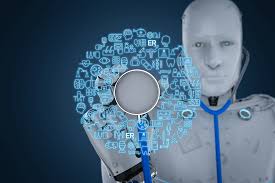Introduction
Artificial Intelligence (AI) has emerged as a transformative force in various industries, and healthcare is no exception. With advancements in machine learning, deep learning, and data analytics, AI is revolutionizing diagnostics, treatment planning, drug discovery, and patient care. The integration of AI in medicine promises improved accuracy, efficiency, and personalized healthcare solutions.
This article explores the applications, benefits, challenges, and future prospects of AI in the medical field, providing a comprehensive overview of how this technology is reshaping healthcare.
Applications of AI in Medicine
1. Medical Imaging and Diagnostics
AI-powered imaging tools enhance the accuracy and speed of diagnostics. Machine learning algorithms analyze X-rays, MRIs, CT scans, and ultrasounds to detect abnormalities such as tumors, fractures, and neurological disorders.
Radiology: AI assists radiologists by flagging anomalies in scans, reducing human error.
Pathology: AI helps in detecting cancerous cells in biopsies with high precision.
Ophthalmology: Tools like Google’s DeepMind can diagnose diabetic retinopathy from retinal scans.
2. Drug Discovery and Development
AI accelerates drug discovery by analyzing vast datasets to identify potential drug candidates.
Predictive Modeling: AI predicts how different compounds will interact with biological systems.
Clinical Trials: AI optimizes trial designs by selecting suitable participants and monitoring outcomes.
3. Personalized Medicine
AI enables tailored treatment plans based on a patient’s genetic makeup, lifestyle, and medical history.
Genomics: AI analyzes genetic data to predict disease risks and recommend preventive measures.
Wearable Devices: AI-powered wearables monitor vital signs and alert users to potential health issues.
4. Virtual Health Assistants and Chatbots
AI-driven chatbots (e.g., Ada, Buoy) provide preliminary diagnoses and medical advice, reducing the burden on healthcare professionals.
Symptom Checkers: AI assesses symptoms and suggests possible conditions.
Mental Health Support: AI chatbots like Wombat offer cognitive behavioral therapy (CBT) for anxiety and depression.
5. Robotic Surgery
AI-assisted robotic systems enhance surgical precision, minimize invasiveness, and reduce recovery times.
Da Vinci Surgical System: A robotic platform that allows surgeons to perform complex procedures with enhanced control.
AI-Guided Surgeries: AI helps in real-time decision-making during operations.
6. Predictive Analytics for Patient Care
AI analyzes electronic health records (EHRs) to predict disease progression and hospital readmission risks.
Early Disease Detection: AI identifies patterns indicating conditions like sepsis or heart failure before symptoms appear.
Hospital Management: AI optimizes bed allocation and staff scheduling.
Benefits of AI in Healthcare
1. Improved Accuracy and Efficiency
AI reduces diagnostic errors and speeds up processes, leading to better patient outcomes.
2. Cost Reduction
By automating routine tasks, AI lowers operational costs for hospitals and clinics.
3. Enhanced Patient Experience
AI enables remote monitoring, reducing hospital visits and improving convenience.
4. Faster Drug Development
AI shortens the time required for drug discovery, bringing life-saving medications to market sooner.
5. Democratization of Healthcare
AI-powered telemedicine makes healthcare accessible in remote and underserved areas.
Challenges and Ethical Concerns
Despite its potential, AI in medicine faces several challenges:
1. Data Privacy and Security
Patient data must be protected from breaches and misuse.
2. Bias in AI Algorithms
If trained on biased datasets, AI may produce inaccurate or discriminatory results.
3. Regulatory and Legal Issues
Clear guidelines are needed to govern AI use in clinical settings.
4. High Implementation Costs
Developing and integrating AI systems requires significant investment.
5. Dependence on Technology
Over-reliance on AI may reduce human expertise in medicine.
Future of AI in Medicine
The future of AI in healthcare is promising, with advancements such as:
AI-Integrated Nanobots: For targeted drug delivery and cellular repair.
– **Brain-Computer Interfaces (BCIs):** Helping paralyzed patients communicate.
AI-Powered Preventive Care: Predicting and preventing diseases before they occur.
AI is transforming the medical field by enhancing diagnostics, personalizing treatments, and improving patient care. While challenges like data privacy and algorithmic bias remain, ongoing research and ethical frameworks will ensure responsible AI adoption. As technology evolves, AI will play an even greater role in shaping the future of healthcare, making it more efficient, accessible, and patient-centric.
The integration of AI in medicine is not just a trend—it’s a revolution that will save lives and redefine healthcare for generations to come.



